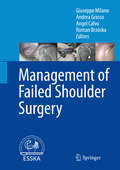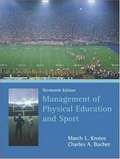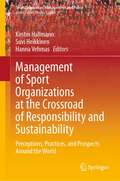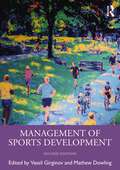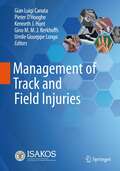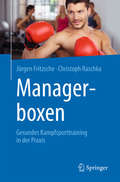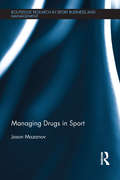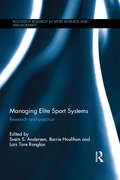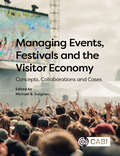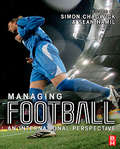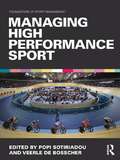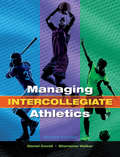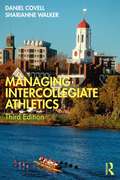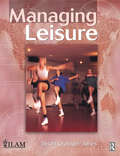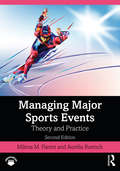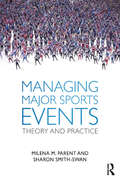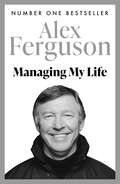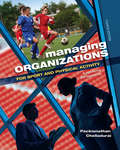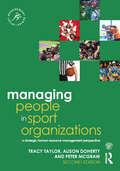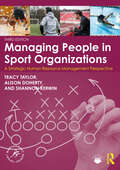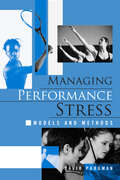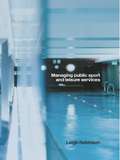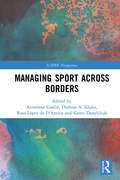- Table View
- List View
Management of Failed Shoulder Surgery
by Giuseppe Milano Andrea Grasso Angel Calvo Roman BrzóskaIn this book, leading European shoulder experts review the current status in the management of failures of surgical treatment of different pathological conditions around the shoulder, such as instability of the glenohumeral joint and the acromioclavicular joint, rotator cuff disease and pathology of the long head of the biceps tendon, and glenohumeral osteoarthritis. The aim is to equip readers with clear guidance on how to manage such failures in everyday practice. There is a particular focus on all aspects of the management response to failure of shoulder arthroplasty. Information is provided on the reasons for failure of the various procedures, and key points on controversial topics are highlighted. Furthermore, case examples are used to present challenging scenarios and their possible solutions. The numerous high-quality illustrations aid comprehension, and readers will also have access to supplementary online videos. The book, published in cooperation with ESSKA, will be invaluable for orthopaedic surgeons and highly relevant for other medical and health practitioners such as sports medicine doctors, physical medicine doctors, and physical therapists.
Management of Physical Education and Sport (Thirteenth Edition)
by Charles A. Bucher March L. KroteeThis book offers a solid foundation of management concepts, skills, and techniques that enable students to develop and test the leadership, decision-making, and problem-solving required for their role in the profession of physical education and sport.
Management of Sport Organizations at the Crossroad of Responsibility and Sustainability: Perceptions, Practices, and Prospects Around the World (Sports Economics, Management and Policy #25)
by Kirstin Hallmann Hanna Vehmas Suvi HeikkinenThis edited volume evaluates how sport organizations in the public, private, and non-profit sectors define responsible management and sustainability and what these mean in their daily operations. Using country-specific cases, the chapters provide an empirical investigation of sport organizations in each sector, analyzing managerial decisions and policies through a sustainability lens. All chapters are structured in the same way, providing a truly comparative approach. Offering insights for scholars interested in responsibility and sustainability in different context, this volume will be important to undergraduate and postgraduate sport management, event management, sport science, and sport study programs around the globe.
Management of Sports Development
by Vassil Girginov Mathew DowlingNow in a fully revised and significantly expanded new edition, Management of Sports Development is a complete introduction to the theory, policy and practice of sports development. With a focus on professional knowledge and managerial competencies, this book defines conceptually and semantically the field of sports development and explains how a clear vision, managed processes of change and effective delivery can lead to the best sustainable outcomes for people, communities and sports organisations.The first section of this book introduces the developmental doctrines that underpin contemporary sports development and considers how research and writing about sports development influence policy and practice. The second section of this book then explores the diversity of perspectives and interests in the sports development landscape, from public policy, international sports development to cultural perspectives and social value. The third section takes a closer look at the personal, organisational and social change stimulated by sports development visions, a critical consideration for effective strategy, programme implementation and management, including current issues such as social justice, sustainability and mega‑sporting events. The fourth and final section of this book looks closely at delivery, unpacking key functional areas such as governance, building organisational capacity, networks and partnerships, volunteering, digitalisation, and monitoring and evaluation.Management of Sports Development is an essential textbook for any sport development course and is invaluable reading for any policy maker or practitioner looking to improve their subject knowledge or professional skills.
Management of Track and Field Injures
by Gian Luigi Canata Gino M. M. J. Kerkhoffs Kenneth J. Hunt Pieter D’Hooghe Umile Giuseppe LongoThis volume offers a comprehensive guide to the prevention, management of injury, risk factor mitigation, and rehabilitation in track and field athletes. It serves as a valuable resource for the sports medicine community, including surgeons, sports medicine physicians, physical therapists, and athletic trainers.In addition to addressing current management techniques for injuries, the book discusses various special considerations, e.g. biologics, the aging athlete, rehabilitation, nutrition, and gender.Published in collaboration with ISAKOS, this book offers an updated information authored by experts in the field, and a valuable contribution to the field of orthopedics and sports medicine.
Management wirtschaftlicher Krisen im deutschen Profifußball
by Konstantin DrukerProfessionelle Fußballclubs sind nicht nur Wirtschaftsunternehmen, sondern auch„ kulturelle Artefakte“. Damit unterliegen sie einerseits allen Regelungen und Gesetzen, die auch für „gewöhnliche“ Unternehmen gelten, weisen aber gleichzeitig ökonomische Spezifika auf. Diese werden insbesondere bei der Entstehung und dem Management von wirtschaftlichen Krisen deutlich. Ein Club hat im Grunde einen unsterblichen Kern und mit zunehmender sportlicher Erfolgshistorie scheinen Fußballclubs sogar grundsätzlich „too-popular-to-fail“ zu werden. Konstantin Druker zeigt in dieser wissenschaftlichen Arbeit, welchen ökonomischen Besonderheiten Clubs unterliegen und welche Implikationen dies für wirtschaftliche Krisen und deren Lösung hat. Der Autor Dr. Konstantin Druker ist Consultant und Sports Business Experte bei einer internationalen Unternehmensberatung. Zuvor war er an der SRH Hochschule in Heidelberg in der Lehre und Forschung in den Bereichen Finanzmanagement und Sportmanagement tätig. Er hat sein Studium der Betriebswirtschaftslehre und der Sportwissenschaft mit Schwerpunkt Sportökonomie an der Johannes Gutenberg–Universität in Mainz sowie der Høgskolen i Østfold (Norwegen) absolviert. Seine Promotion erlangte er an der Friedrich-Schiller-Universität in Jena.
Managerboxen: Gesundes Kampfsporttraining In Der Praxis
by Jürgen Fritzsche Christoph Raschka Anna-Maria Fritzsche Holger BrüningBeim sogenannten Managerboxen werden die Trefferregion „Kopf“ und damit das eigentlich „Gesundheitsschädliche“ im Boxsport ausgespart, sodass sich diese Sportart zunehmend auch dem Breiten- und Hobbysportler öffnet. Das Buch stellt alle wesentlichen Grundlagen eines gesundheitlichen Boxsports ohne Trefferregionen im Kopfbereich vor und beschreibt praxisnah und reich bebildert die gezielten Trainingsprogramme. Im Detail werden Kraft- und Ausdauertraining, Koordination, Angreifen, Strategie und Taktik sowie die notwendige Ausrüstung vorgestellt. Das Buch richtet sich grundsätzlich an alle am Boxen Interessierten, die keine gesundheitlichen Schäden erleiden wollen. Aber auch Sportmediziner, Sportwissenschaftler, Trainer, Studenten erhalten einen guten Überblick zum gezielten Trainingsaufbau ihrer Patienten bzw. Klienten.
Managing Drugs in Sport (Routledge Research in Sport Business and Management)
by Jason MazanovAs ongoing high-profile drug scandals have demonstrated, sports organisations rarely have a coherent strategy to manage the role and relationship their sport has with different types of drugs (from alcohol to supplements to prescription drugs to doping). This important and timely book argues that drug control-led integrity management of sport is more than an ideological battle around doping. The relationship sport has with the drugs industry has become a much broader management problem. The breadth of the problem compels stakeholders in sport (including athletes, coaches, fans, public servants and sports managers) to understand better the issues in pursuit of effective strategies and responses. Drawing on cutting-edge management theory, this book explores the dilemma of drugs in sport. It introduces the policy and business contexts that have shaped responses to this issue and examines its significance to sport and integrity management, including human resource management, marketing, and risk management. It discusses practical management concerns, such as working with scientists and anti-doping organisations, and offers clear recommendations for the future management of sports integrity. The first book to offer a complete framework for a drugs management strategy for sport, Managing Drugs in Sport is essential reading for all advanced students, researchers and practitioners working in sport management, sport business, sport policy, sport governance and business ethics.
Managing Elite Sport Systems: Research and Practice (Routledge Research in Sport Business and Management)
by Barrie Houlihan Svein S. Andersen Lars Tore RonglanOver the last twenty years or so there has been a sharp increase in interest from national sports federations and governments in the development of effective elite sport systems, particularly focused on achieving success in the summer and winter Olympic Games. Many countries now have publicly funded elite sports strategies which provide specialist facilities and support staff and often provide direct financial support for athletes. These developments have stimulated academic interest in describing the elite sport systems, analysing the processes by which policy is established and evaluating the impact of these policies on elite athlete success. Far less attention has been placed on the operation of the elite sports systems and on how the system interfaces with the athlete. The aim of this book is to refocus attention on the management and operation of systems designed to deliver elite success. The book draws on the theoretical literature in implementation, organisation theory, leadership and complexity. This provides an initial context for analysis and a stimulus for theory development around key questions such as: How do coaches manage their relationship with athletes? How does talent identification operate in practice? Do coaches fulfil the role of gatekeeper between the athlete and other elements of the sports system e.g. sports science support? How do managers, support staff and athletes interpret the expectations placed on them? The first part of the book focuses on aspects of the effectiveness of elite sports systems and the second explores aspects of systems operation focused on the interface between the athlete and the sport development system, and cross-cutting themes within the book include the management of talent identification and coach development. This is illuminating reading for any student, researcher or practitioner working in sport development, sport management or sports coaching.
Managing Events, Festivals and the Visitor Economy: Concepts, Collaborations and Cases
by Nick Taylor Alan Fyall Elizabeth Halpenny Martin Robertson Judith Mair Hugues Seraphin Lino Briguglio Leonie Lockstone-Binney Professor Maximiliano Korstanje Dr Anna Leask Desmond Wee Tadayuki Hara Abigail Hunt Andrea Barber Ning Chris Chen Barry Ardley Marie Avellino Simon Gerard Werner Gilde Claudia Green Dr Marcus Hansen Miles Hedison Anle Li Kim Macmillian Anthony May Yong Rao Mostafa Selima Gabriel Marin Vendenbroucke Richard Voase Kenneth Wardrop Nanxi YanThis edited text, intended to support a research-informed approach to learning and teaching, presents an array of concepts, collaborations and in-depth cases related to managing events, festivals and the visitor economy. Authors offer an array of philosophical, political, cultural, and ethical perspectives on how to achieve this across a range of contexts, from Cambodia, China, Egypt to the British cathedral city of Lincoln. Though recognising individual difference, each chapter unites in their common pursuit of supporting the United Nations Sustainable Development Goals (UNSDGs). This is significant as utilising the UNSDGs as a normative organising framework for how we all think about, plan, and manage a 'good' visitor economy is increasingly ubiquitous. It is with this in mind that each chapter provides explicit links to the UNSDGs and policy and/or practical implications, along with a series of critical self-assessment questions to reflect on the chapter's key arguments. This collection aims to satiate what appears to be an increasing appetite of readers and students alike who seek exposure to rigorous debate in and out of the classroom.
Managing Football
by Simon Chadwick Sean HamilManaging Football is the first book to directly respond to the rapid managerial, commercial and global development of the sport and offers a thorough analysis of how the football industry can meet the challenges that flow from these developments. Expertly edited by two well known specialists in football business management, it draws together the work of a world-class contributor team to form a comprehensive analysis of the most important issues facing the managers of football businesses across the world. The cutting edge analysis examines all the important business challenges in the football industry and the management of football businesses and covers all of the key football markets including England, Spain, France, Italy, Germany, Australia, North America, China, South Africa, South Korea, the Netherlands & Belgium, and Mexico. Managing Football is simply a must-read for anyone studying or working in football business management and is set to be an important landmark in this rapidly moving and globally expansive field.
Managing High Performance Sport (Foundations of Sport Management)
by Popi Sotiriadou Veerle De BosscherHow can managers design and implement effective high performance programmes in sport? What are the key challenges in managing elite athletes, sports people and teams? This is the first book to provide a comprehensive introduction to management practice, process and policy in elite and high performance sport (HPS). Drawing on real-world case-studies of elite sport around the world, the book shows a conceptual framework for studying and analysing high performance sport and introduces the skills and techniques that managers and administrators will need to develop effective HPS programmes. The book examines the macro level factors that determine a nation’s sporting success, including political, social and cultural elements, and then moves on to unpack the specifics of elite athlete and team management at a micro level. Adopting an integrated, holistic approach throughout, the book highlights best practice in every key area of an HPS programme, including: defining performance and success organizational structure and leadership finance, funding and marketing coaching and coach development talent identification and development competition and events training and facilities scientific research and sport science support. The book features contributions from world-leading sport management academics as well as practitioners with experience of managing HPS programmes at world and Olympic level. Each chapter includes a full range of useful features, such as summaries, case-studies, review questions and guides to further reading. This is essential reading for all serious students and professionals working in sport management or high performance sport.
Managing Intercollegiate Athletics
by Daniel Covell Sharianne WalkerThis practical, comprehensive book combines solid theoretical concepts with relevant examples, extensive factual information, and important insider perspectives to help prepare students who are interested in pursuing a career in collegiate athletics management. The authors' in-depth discussions reveal the inner workings of athletic departments and the conferences and governing organizations that impact them. Using examples from institutions of varying sizes and representing numerous conferences, associations, and divisions, Managing Intercollegiate Athletics, second edition, provides an extensive view of management processes such as generating revenue to cover expenses; recruiting and its mechanics and regulations; the role of the conferences and national governing bodies; and academic standards, reform, and fraud.New to the second edition is an increased emphasis on the impact of division, institution, and department missions and goals on decision making. The book also includes new discussions of the application of management functions--including goal setting, decision making, and strategic management--on intercollegiate athletics at various levels.Adding to the practical nature of the book, and providing an important critical-thinking component to each chapter, are "Practitioner Perspectives." These contributions demonstrate how and why administrators make and implement their decisions, and they present creative problem-solving ideas for readers that they can use in their own careers. New Practitioner Perspectives in this edition provide, for example, an insider's view from an NCAA vice president, a conference commissioner, and a Division I athletic director.Chapters also feature one or more Case Studies offering an in-depth look at how institutions grapple with management challenges. In the second edition, new case studies look at the NCAA's leadership role in the Penn State University abuse case, the role of the TRAC model to ensure data-based decision making in terminating the University of Alabama at Birmingham football program, and others. These case studies and accompanying questions can serve as starting points for class discussion.
Managing Intercollegiate Athletics
by Daniel Covell Sharianne WalkerManaging Intercollegiate Athletics is the leading introduction to the management and governance of college sport. Now in a fully revised and updated third edition, this book reveals the inner workings of athletic departments and the conferences and governing organizations with which they work, offering insider perspectives to help prepare students who are interested in pursuing a career in collegiate athletics management. Written in a user-friendly style, and containing real world cases, data and examples in every chapter, the book introduces the key managerial concepts that every successful professional needs to know, and takes the reader through the core management process and functions, from goal-setting and strategy to recruiting, finance and change management. With a strong focus on practical skills, the book also encourages critical thinking and includes interviews with successful practitioners in every chapter. This new edition includes a brand-new chapter on professional development and expanded coverage of ethical issues, diversity and social justice in sport. It contains new case studies and examples throughout, and has been updated to reflect changes to NCAA bylaws and legislation. This is an essential textbook for any course on intercollegiate athletics and invaluable supplementary reading for any courses on sport management, sport marketing, sport fundraising, sport governance or higher education management. The book is accompanied by updated online resources, featuring PowerPoint slides and an instructor manual.
Managing Leisure
by Byron Grainger-JonesManaging Leisure is an excellent reference tool for both students and practitioners in the leisure industry.It provides detailed and practical advice on managing buildings, budgets and people. It also covers the vital aspects of law, finance, health & safety and competitive tendering. Managing Leisure takes management theory and looks at its practical application in a leisure management context.Ideal for students studying leisure management, this book will also appeal to practitioners in the field as a handy reference book.
Managing Major Sports Events: Theory and Practice
by Milena M. Parent Aurélia RuetschManaging Major Sports Events: Theory and Practice is a complete introduction to the principles and practical skills that underpin the running and hosting of major sports events, from initial bid to post-event legacy and sustainability. Now in a fully-revised and updated new edition, the book draws on the latest research from across multiple disciplines; explores real-world situations, and emphasises practical problem-solving skills. It covers every key area in the event management process, including: • Bidding, leadership, and planning • Marketing and human resource management • Venues and ceremonies • Communications and technology (including social media) • Functional area considerations (including sport, protocol, and event services) • Security and risk management • Games-time considerations • Event wrap-up and evaluation • Legacy and sustainability This revised edition includes expanded coverage of cutting-edge topics such as digital media, culture, human resources, the volunteer workforce, readiness, security, and managing Games-time. Each chapter combines theory, practical decision-making exercises and case studies of major sports events from around the world, helping students and practitioners alike to understand and prepare for the reality of executing major events on an international scale. Also new to this edition is an &‘Outlook, Trends and Innovations&’ section in each chapter, plus &‘tips&’ by leading events professionals. Managing Major Sports Events: Theory and Practice is an essential textbook for any course on sports event management or international sports management, and an invaluable resource for all sport management researchers, practitioners and policy-makers. Online resources include PowerPoint slides, multiple choice questions, essay questions and decision-making exercises.
Managing Major Sports Events: Theory and Practice
by Milena M. Parent Sharon Smith-SwanThe hosting of major sporting events can be a key tool in the development of cities and countries around the world. If carried out effectively these events can not only bring prestige to an area but can leave the local population with a legacy of improved infrastructure and facilities. Managing Major Sports Events: Theory and Practice is a complete introduction to the principles and practical skills that underpin the running and hosting of major sports events, from initial bid to post-event legacy. The book draws closely on the authors’ personal practical experiences of day-to-day management during the 2010 Winter Olympics in Vancouver, now widely regarded as the gold standard of Olympic organisation. Drawing on the latest research from across multiple disciplines, it covers every key area in the event management process, including: Bidding, leadership and planning Venue implementation Communications (e.g., media, marketing and sponsorship, technology) Functional area considerations (e.g., sport, protocol, security and risk management) Games-time considerations Ceremonies Legacy and sustainability. Each chapter contains a unique combination of theory, practical decision-making exercises and case studies of major sports events from around the world, helping students and practitioners alike to understand and prepare for the reality of executing major events on an international scale. A companion website includes self-test quizzes and flashcards for students, links to 110 useful websites, 173 summary slides, plus 45 essay questions and extended decision-making exercises for lecturers. Managing Major Sports Events: Theory and Practice is an essential textbook for any course on sports event management or international sports management and an invaluable resource for all sport management researchers and professionals.
Managing My Life: The first book by the legendary Manchester United manager
by Alex FergusonThis book is about the beginning of Sir Alex's football career, until the year 2000. 1999 was an outstanding year for Alex Ferguson - not only did he lead Manchester United, the most glamorous club in the world, to a unique and outstanding treble triumph, but he was awarded the highest honour for his sporting achievements; a Knighthood from the Queen. Universally respected for his tough, but caring managerial style, Ferguson is an unusually intelligent man with a fascinating life story. Covering his tough Govan upbringing through to his playing days and onto his shift into management, Managing My Life is told with the fine balance of biting controversy and human sensitivity which made it such an unprecedented success in hardback. Alex Ferguson is a legend in his lifetime.
Managing My Life: The first book by the legendary Manchester United manager
by Alex FergusonThis book is about the beginning of Sir Alex's football career, until the year 2000.1999 was an outstanding year for Alex Ferguson - not only did he lead Manchester United, the most glamorous club in the world, to a unique and outstanding treble triumph, but he was awarded the highest honour for his sporting achievements; a Knighthood from the Queen. Universally respected for his tough, but caring managerial style, Ferguson is an unusually intelligent man with a fascinating life story. Covering his tough Govan upbringing through to his playing days and onto his shift into management, Managing My Life is told with the fine balance of biting controversy and human sensitivity which made it such an unprecedented success in hardback. Alex Ferguson is a legend in his lifetime.
Managing Organizations for Sport and Physical Activity: A Systems Perspective
by Packianathan ChelladuraiManaging Organizations for Sport and Physical Activity, fourth edition, presents a clear and concise treatment of managing organizations in sport and physical activity. The four functions of management--planning, organizing, leading, and evaluating--provide a general framework that represents the simplest and best approach for introducing readers to the intricacies of management. For each management function, Chelladurai presents relevant theories and their practical applications, citing those theoretical models that are most appropriate to the unique aspects of the sports industry. He uses the open systems perspective, placing organizations in the context of their environment and emphasizing the manager's role in adapting and reacting to changes in that environment. To apply theory to sport management practices, Chelladurai provides numerous examples from the fields of physical activity and sport, including professional sports, intercollegiate athletics, health and sports clubs, and recreation/fitness programs. New to the Fourth Edition A chapter on service quality, which describes the notion of quality in sport management services--from the local fitness center to the pro sport arena. It also discusses the measurement of service quality and the gaps in translating customer expectations into the desired service. A new feature providing "An Expert's View," which offers additional perspectives on relevant topics contributed by scholars who research and publish in a specific area. New sidebars on current topics relevant to the field of sport management; some examples include US Track and Field's SMART goal setting as well as genes and technology of leadership.Pedagogical Aids Developing Your Perspective. Thought-provoking questions ask learners to apply theoretical information to contexts relevant to them from their current experiences or in their future careers. Managing Your Learning. Key points from each chapter enhance comprehension. Strategic Concepts. Key terms lists provide for a shared vocabulary in discussing the major concepts of management. In Brief. Short summaries of the important points in a section help crystallize concepts. To Recap. Brief boxes revisit key concepts discussed earlier in the book. Extensive references to journals, scholarly texts, and relevant websites.
Managing People in Sport Organizations: A Strategic Human Resource Management Perspective (Sport Management Series)
by Tracy Taylor Alison Doherty Peter McGrawManaging People in Sport Organizations provides a comprehensive overview of the theory and practice of managing people within a strategic framework. This revised and updated second edition examines a range of strategic human resource management approaches that can be used by sport organizations to respond to contemporary challenges and to develop a sustainable performance culture. Drawing on well-established conceptual frameworks and current empirical research, the book systematically covers every key area of HRM theory and practice, including: recruitment training and development performance management and appraisal motivation and reward organizational culture employee relations diversity managing change This new edition also includes expanded coverage of social media, volunteers, and individuals within organizations, and is supported with a new companion website carrying additional resources for students and instructors, including PowerPoint slides, exam questions and useful web links. No other book offers such an up-to-date introduction to core concepts and key professional skills in HRM in sport, and therefore?Managing People in Sport Organizations?is essential reading for any sport management student or any HR professional working in sport.
Managing People in Sport Organizations: A Strategic Human Resource Management Perspective (Sport Management Series)
by Tracy Taylor Alison Doherty Shannon KerwinNow in a fully revised and updated third edition, Managing People in Sport Organizations outlines the theory and practice of managing people within a strategic framework.A complete textbook for any human resource management (HRM) in sport course, it explains how sport managers can get the best out of their teams and organizations, develop their professional skills, and create a sustainable performance culture. Structured around the functional flow of HRM practice – from recruitment to rewards – the book introduces every key area of people management, including strategy, planning, training, performance management, and managing change. This new edition includes expanded coverage of topics such as e-HRM and post-COVID workplaces. There is also a new foundational chapter focused on the individual in the organization that sets the context for their effective management.With international cases, examples, and data included in every chapter, this is essential reading for any sport management student or HR professional working in sport.
Managing Performance Stress: Models and Methods
by David PargmanOver the past 16 years, new theories and models have emerged in the stress and anxiety knowledge base regarding the unique forms associated with performance. Existing theories have been applied in creative and helpful ways to better explicate relationships between stress and anxiety with performance. Recently, more sophisticated statistical strategies have been applied to data collected with performers, and additional, safe and expedient strategies for managing stress and anxiety have surfaced. Despite these new advances, the field has been lacking an up-to-date and practical text for undergraduate and graduate students in performing or performance-mentoring programs. Managing Performance Stress examines psychological and psychophysiological models and theories that explain causes of anxiety and stress. An easy-to-use reference work for athletes, musicians, dancers and actors as well as those who devise and conduct their training programs, the book presents exercises, coaching devices, and strategies for conquering stress and anxiety. It is an invaluable resource for those who are performers, will be performers, or who are preparing to mentor, coach or teach performers. The principles enunciated in Managing Performance Stress apply equally to the musician holding an oboe and the athlete holding a baseball bat. The issues explored and the theories, principles, models, hypotheses discussed all bear upon and clarify arousal, stress and anxiety related to artistic and sport performance, irrespective of its kind.
Managing Public Sport and Leisure Services
by Leigh RobinsonThe public sector is the largest provider of sport and leisure facilities and the biggest employer of leisure management graduates – the last decade has seen enormous changes in this sector. In this significant new student textbook – the first to investigate leisure management in a public sector context – Leigh Robinson examines the unique issues facing public sector managers and analyzes the application of contemporary management strategies and techniques to public sector leisure. It provides thorough coverage of the work and skills required in addition to the challenges and issues facing leisure managers. This book also challenges the perceptions and negative comparisons with the private sector. Written using a clear and user-friendly style, this textbook will be core reading for students of sport, leisure and recreation management, and makes an accessible reference for practicing managers working across the spectrum of leisure provision, from sport facilities through to parks, arts and heritage.
Managing Sport Across Borders (ICSSPE Perspectives)
by Darlene A. Kluka Annaliese Goslin Rosa Lopéz De D'Amico Karen DanylchukSport is both a global business and a vehicle for social inclusion and community development. This book examines key performance areas in sport management that cut across cultural, economic and geographical borders, from both commercial and social justice perspectives. Written by leading sport management and sport development scholars from around the world, the book highlights international management challenges, suggests appropriate management practices, and raises questions to stimulate further debate. From a commercial sport management perspective it explores key topics including the management of sport communication in an age of digital media, crowd funding in sport, managing government and commercial alliances, and managing power and politics in sport. From a social justice perspective, it examines issues including sport volunteer management, the management of sport for inclusion, and academic partnerships in international sport management. Offering an authoritative survey of contemporary international sport management, as well as signposts for future research and practice, this is fascinating reading for all students, researchers and practitioners working in sport management or sport development.
